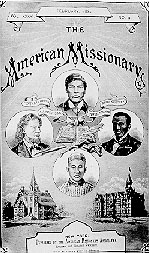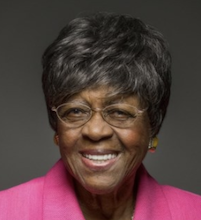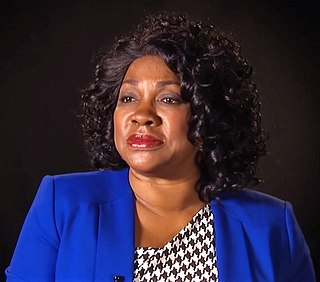Related Research Articles

Pinckney Benton Stewart Pinchback was an American publisher, politician, and Union Army officer. Pinchback was the second African American to serve as governor and lieutenant governor of a U.S. state. A Republican, Pinchback served as acting governor of Louisiana from December 9, 1872, to January 13, 1873. He was one of the most prominent African-American officeholders during the Reconstruction Era.

Dillard University is a private, historically black university in New Orleans, Louisiana. Founded in 1930 and incorporating earlier institutions founded as early as 1869 after the American Civil War, it is affiliated with the United Church of Christ and the United Methodist Church.

Fannie Lou Hamer was an American voting and women's rights activist, community organizer, and a leader in the civil rights movement. She was the vice-chair of the Freedom Democratic Party, which she represented at the 1964 Democratic National Convention. Hamer also organized Mississippi's Freedom Summer along with the Student Nonviolent Coordinating Committee (SNCC). She was also a co-founder of the National Women's Political Caucus, an organization created to recruit, train, and support women of all races who wish to seek election to government office.

Straight University, was an American historically black college that operated between 1868 and 1934 in New Orleans, Louisiana. After struggling with financial difficulties, it was merged with New Orleans University to form Dillard University.

Camilla Ella Williams was an American operatic soprano who performed nationally and internationally. After studying with renowned teachers in New York City, she was the first African American to receive a regular contract with a major American opera company, the New York City Opera. She had earlier won honors in vocal competitions and the Marian Anderson Fellowship in 1943–44.

Tougaloo College is a private historically black college in the Tougaloo area of Jackson, Mississippi. It is affiliated with the United Church of Christ and Christian Church. It was originally established in 1869 by New York–based Christian missionaries for the education of freed slaves and their offspring. From 1871 until 1892 the college served as a teachers' training school funded by the state of Mississippi. In 1998, the buildings of the old campus were added to the National Register of Historic Places.

The American Missionary Association (AMA) was a Protestant-based abolitionist group founded on September 3, 1846 in Albany, New York. The main purpose of the organization was abolition of slavery, education of African Americans, promotion of racial equality, and spreading Christian values. Its members and leaders were of both races; The Association was chiefly sponsored by the Congregationalist churches in New England. The main goals were to abolish slavery, provide education to African Americans, and promote racial equality for free Blacks. The AMA played a significant role in several key historical events and movements, including the Civil War, Reconstruction, and the Civil Rights Movement.
The Louisiana Weekly is a weekly newspaper published in New Orleans, Louisiana. It emphasizes topics of interest to the African-American community, especially in the New Orleans area and south Louisiana. It has an estimated weekly circulation of 6,500.
Theodore Kenneth (T.K.) Lawless was an American dermatologist, medical researcher, and philanthropist. He was a skin specialist, and is known for work related to leprosy and syphilis.
Rhetaugh Etheldra Graves Dumas (1928–2007) was an American nurse, professor, and health administrator. Dumas was the first Black woman to serve as a dean at the University of Michigan. She served as the dean of the University of Michigan Nursing School. She also served as deputy director of the National Institute of Mental Health, becoming the first nurse, female, or African-American to hold that position. She is said to have been the first nurse to use the scientific method to conduct experiments that evaluated nursing practices.

The Amistad Research Center (ARC) is an independent archives and manuscripts repository in the United States that specializes in the history of African Americans and ethnic minorities. It is one of the first institutions of its kind in the United States to collect African American ethnic historical records and to document the modern Civil Rights Movement.
Albert Walter Dent was an academic administrator who served initially as business administrator of Flint-Goodridge Hospital and later as president of Dillard University (1941–1969), a predominantly black liberal arts college in New Orleans, Louisiana. In these roles, he was a community leader who improved education and health care for African-Americans and impoverished people in the American South.

Clifton Herman Johnson (1921–2008) was an American historian noted for founding the Amistad Research Center and for his work on documenting African-American history.
Jane Ellen McAllister was an American educator. She was the first African American woman to earn a PhD in Education in the United States, and the first African American female in the world to be a doctoral candidate in Education.

Ernestine Jessie Covington Dent was an American pianist, music educator, and community leader. She was the wife of Dillard University president Albert W. Dent, and the mother of poet and activist Thomas Dent.

Ida Louise Jackson was an American educator and philanthropist. She attended and graduated from the University of California, Berkeley following her family’s move to California. As one of 17 Black students that attended the university at the time, Jackson prioritized creating safe spaces for African American community members. Throughout her undergraduate career, Jackson was invested in a teaching career, specifically in Oakland, California. Despite push back from school administration, her dreams were finally realized in 1926 when she became the first African American woman to teach high school in the state of California. At the same time, her ambitions were rooted in giving back to her community back in Mississippi. Through the networks that she formed in California, Jackson returned back to her home state in 1935 to develop programs around education and health care for poor, rural Black folks. Ida Louise Jackson’s contributions were celebrated by her alma mater and the University of California, Berkeley named their first graduate apartment housing unit in her honor.

Florence Edwards Borders was an American archivist, historian, and librarian. She specialized in the preservation of African American historical artifacts, especially those related to Afro-Louisianans.

Hattie Virginia Feger was an American educator. She was on the faculty of Clark Atlanta University in the 1930s and 1940s.

Beverly Wright is an American environmental justice scholar and the founder of the Deep South Center for Environmental Justice at Dillard University. Her research considers the environmental and health inequalities along the Mississippi River Chemical Corridor. Her awards and honours include the Environmental Protection Agency Environmental Justice Achievement Award.
Reber Simpkins Cann was an American educator, social worker and community activist.
References
- ↑ "Who was Fannie C. Williams?". fcwcs.org. Retrieved 2018-06-27.
- ↑ "Williams, Fannie C. (1882-1980) | Amistad Research Center". amistadresearchcenter.tulane.edu. Retrieved 2018-06-27.
- ↑ "Amistad Research Center | Independent Archive". Amistad Research Center | Independent Archive. Retrieved 2018-06-27.